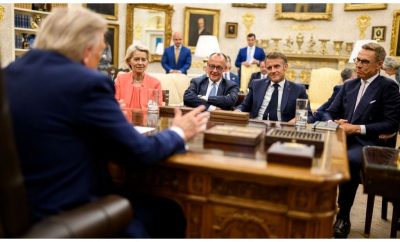
Macron’s fears for Europe
French President Emmanuel Macron referred to NATO as brain dead and questioned whether the alliance is still fit for purpose with America’s commitment in question in an interview with The Economist.
Macron’s worldview:
- The consensus behind the trans-Atlanticalliance is obsolete.
“Europe was basically built to be the Americans’ junior partner. … And this went hand in hand with a benevolent United States, acting as the ultimate guarantor of a system … based on the preservation of world peace and the domination of Western values. There was a price to pay for that, which was NATO and support to the European Union.”
- Europe could “disappear geopolitically” due to…
- America’s shifting strategies — first Obama’s pivot to Asia and now Trump’s disregard for alliances.
- The “bipolarization” of the world between the U.S. and a rising China, which “clearly marginalizes Europe.”
- “The re-emergence of authoritarian powers on the fringes of Europe,” namely Turkey and Russia.
- “An internal European crisis” that has raged for a decade.
- His bottom line:Europe needs to assert itself as a global power in its own right, or slide into irrelevance.
- Europe is playing catch-up.
- Macron said Europe’s “trade-maximizing” mindset was based on the belief “there will be no more great wars, tragedy has left the stage, all is wonderful.”
- Now the world is “breaking up again” and the U.S. is turning its back on the alliance and the world order it shaped.
- That reality requires European autonomy, Macron argues. In his view, that means integration but notEU expansion (France controversially blocked accession talks with North Macedonia and Albania).
- France must be a “balancing power,”with “the right not to be outright enemies with our friends’ enemies.”
“We can speak to people and therefore build balances to stop the whole world from catching fire.”
- Russia should be a partner.
- Macron argues that Russia probably can’t rebuild itself as a go-it-alone superpower and is unwilling “to be China’s vassal,” so it must therefore move toward “a partnership project with Europe.”
- He admits that’s based on logic, not on Vladimir Putin’s behavior. But he asserts nonetheless: “we have the right to autonomy, not just to follow American sanctions, to rethink the strategic relationship with Russia.”
Πηγή: axios.com
-Macron, Europe’s wannabe president
Throughout his visit to China, Macron spelled out objectives for the EU and its incoming Commission.
‘BRAIN-DEAD’ NATO: French President Emmanuel Macron diagnosed NATO with “brain death” in an interview with the Economist, urging the EU to step up its own defense efforts and to no longer rely on US support when push comes to shove. Asked whether he saw NATO’s Article 5, which enshrines the principle of mutual defense, as functioning, he said: “I don’t know.” One would expect that from a policy analyst, but perhaps not from the EU’s wannabe president.
His claim didn’t remain undisputed: The alliance’s Secretary-General Jens Stoltenberg shot back immediately, saying that the EU “cannot defend Europe” in a speech in Berlin Thursday. German Defense Minister Annegret Kramp-Karrenbauer, meanwhile, pledged once more (ahead of a meeting today with U.S. Secretary of State Mike Pompeo) that Germany would eventually hit NATO’s defense spending target of 2 percent of GDP. And Chancellor Angela Merkel was also not d’accord with Macron’s statement.
Πηγή: politico.eu
-France’s Macron questions U.S. commitment to NATO in Economist interview
PARIS (Reuters) – French President Emmanuel Macron, in an interview with British weekly The Economist, warned fellow European countries that they could no longer rely on the United States to defend North Atlantic Treaty Organization (NATO) allies.
“What we are currently experiencing is the brain death of NATO,” Macron was quoted as saying.
Asked whether he still believed in the Article Five “collective defense” stipulations of NATO’s founding treaty – under which an attack against one ally is considered as an attack against all allies – Macron answered: “I don’t know”.
Πηγή: reuters.com
-Do Americans Still Want The US to Be the World’s Security Leader?
The post-Trump awakening of political activism is inspiring, but seems to end at the border. We’re teaming up with CNAS to find out why.
Since President Donald Trump’s 2016 election, well, Americans seem to want a lot. There’s been an awakening of political activism in this country, on both sides of the aisle, of people speaking up and speaking out. But the issues that appear to be most engaging — race, gender, health care, education, immigration — are, with the exception of climate change, mostly domestic. When it comes to global security, the nation clearly is less engaged; some want the U.S. out of world affairs entirely. Why?
We need to understand better what Americans know and think about the U.S. leading global security, what they’re doing about it in their own lives, and what’s needed for the future. Defense One is teaming up with the Center for a New American Security, or CNAS, for a yearlong series of articles, commentaries, and events seeking to do just that. We’ll send reporters across the country to look into why Americans think the way they do, and to describe how Americans are working in their own ways on U.S. security challenges, in government, at schools, on factory floors, in boardrooms, in technology labs — even in Hollywood. We’ll feature commentaries from top thinkers at CNAS and beyond. Ultimately, we intend to collect a body of work that shows what Americans really believe, what they want, and what’s needed to deliver it.
Συνέχεια ανάγνωσης εδώ: defenseone.com




